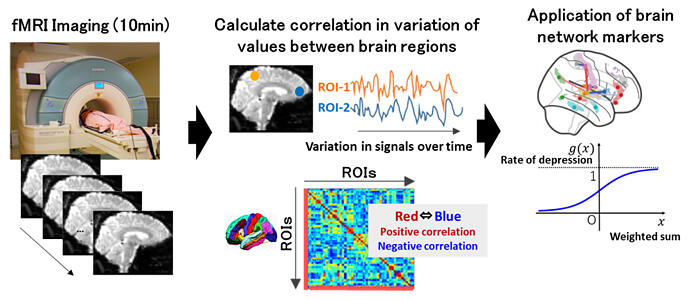A technology that can determine depression with ∼70% accuracy after a 10‐minute fMRI measurement is close to being a reality. A research group led by Associate Professor Go Okada and Professor Yasumasa Okamoto of the Graduate School of Biomedical and Health Sciences at Hiroshima University, and Director Mitsuo Kawato and Senior Researcher Yuki Sakai of the Brain Information Communication Research Laboratory Group at Advanced Telecommunications Research Institute International (ATR) validated the test‐retest reliability and prospective generalization of a brain network depression marker published in 2020 using new data obtained after they had completed the brain network marker. The results confirm the reliability of the brain network marker and show that it is sufficiently sensitive to identify new cases of depression in healthy subjects at one‐year intervals. "Currently, a multi‐site joint study is being conducted at eight medical institutions in Hiroshima, and we will collect data for practical application within one to two years," explained Okada. The group's research was published in the Journal of Affective Disorders.

Provided by Hiroshima University
There have been promising results in research and development conducted around the world to combine fMRI and machine learning to provide objective diagnostic support for depression, but the major challenge has been the inability to replicate the results with data from other sites. This is because machine learning with data from a small number of data samples results in specialized learning that only applies to that data sample.
In 2020, the research group integrated resting‐state fMRI data acquired at multiple sites into a homogeneous large‐scale dataset by identifying model‐derived biases in how much the data varied between different sites in the same brain by having subjects visit different facilities and developed a brain network marker by showing generalization performance to multiple external independent data. However, the external independent data used to validate the generalization performance of the brain network marker at this time were data acquired before the marker was developed, and it was a challenge to evaluate its performance with new data after the brain network marker was developed. In addition to inter‐institutional differences, the high inter‐measurement variability of fMRI measurements in the same person has been a barrier to the development of a reliable brain network marker. Therefore, in the present study, test‐retest reliability and prospective generalization performance were validated with new data acquired after the brain network marker was completed.
Forty‐seven patients with depression and 39 healthy subjects underwent 10‐minute resting‐state fMRI imaging on a 3‐Tesla MRI machine. The diagnosis of depression was confirmed by a structured interview in addition to the clinical diagnosis made by the treating physician. The depression symptoms of each participant on the day of MRI imaging were also assessed using the Japanese version of the self‐administered questionnaire (BDL II).
The researchers applied a parcellation of 379 regions of interest (ROIs) across the whole brain to the resting‐state fMRI data, which had been pre‐processed to correct for possible predictable errors, and correlations over time (functional brain connectivity) between pre‐processed MRI signal values for all pairs of 379 ROIs were calculated for each participant. A brain network marker was applied to these data to calculate the probability of depression for each participant. In this process, the newly acquired fMRI data at Hiroshima University was sent to ATR without diagnostic information, and the depression probability calculated by ATR was checked against the diagnostic information stored at Hiroshima University so that the diagnostic information was not known when calculating the probability of depression.
As healthy individuals had two fMRI imaging sessions a year apart, the test‐retest reliability of the brain network marker was examined by first calculating the intraclass correlation coefficient (ICC) from the probability of depression of two sets of data from the same individual in a healthy population. The results showed moderate reliability with an ICC of 0.45. Next, using data from all participants, the researchers examined the correlation between the probability of depression and its severity, and found there was a significant correlation between the probability of depression and depressive symptoms. Finally, they evaluated the performance of the brain network marker by assuming that the result of the brain network marker was depression if the probability of depression exceeded 50%. They found the classification accuracy was 69.7% (sensitivity 72.1%, specificity 66.7%), which was comparable to previous studies, confirming the prospective generalization performance in the new data.
"We are consulting with the PMDA [Pharmaceuticals and Medical Devices Agency], mainly with XNef, to put the depression brain network marker into practical use, and we plan to apply for approval as a program medical device by the end of this year," said Sakai. "At that stage, using data from a 20‐year paper, we are at the point where we have confirmed safety, but once the results of the multi‐site joint study being conducted in Hiroshima becomes available, we will apply for changes to the effectiveness of the study based on those results and move forward with practical application."
This article has been translated by JST with permission from The Science News Ltd. (https://sci-news.co.jp/). Unauthorized reproduction of the article and photographs is prohibited.




